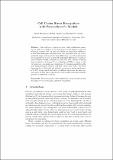| dc.contributor.author | Morris, Robert Randall | |
| dc.contributor.author | Hernandez, Javier | |
| dc.contributor.author | Picard, Rosalind W. | |
| dc.date.accessioned | 2011-12-15T14:15:22Z | |
| dc.date.available | 2011-12-15T14:15:22Z | |
| dc.date.issued | 2011-10 | |
| dc.date.submitted | 2011-10 | |
| dc.identifier.isbn | 978-3-642-24599-2 | |
| dc.identifier.issn | 0302-9743 | |
| dc.identifier.issn | 1611-3349 | |
| dc.identifier.uri | http://hdl.handle.net/1721.1/67691 | |
| dc.description.abstract | Nine call center employees wore a skin conductance sensor
on the wrist for a week at work and reported stress levels of each call.
Although everyone had the same job profile, we found large differences
in how individuals reported stress levels, with similarity from day to day
within the same participant, but large differences across the participants.
We examined two ways to address the individual differences to automat-
ically recognize classes of stressful/non-stressful calls, namely modifying
the loss function of Support Vector Machines (SVMs) to adapt to the
varying priors, and giving more importance to training samples from the
most similar people in terms of their skin conductance lability. We tested
the methods on 1500 calls and achieved an accuracy across participants
of 78.03% when trained and tested on different days from the same per-
son, and of 73.41% when trained and tested on different people using the
proposed adaptations to SVMs. | en_US |
| dc.language.iso | en_US | |
| dc.publisher | Springer Berlin / Heidelberg | en_US |
| dc.relation.isversionof | http://dx.doi.org/10.1007/978-3-642-24600-5_16 | en_US |
| dc.rights | Creative Commons Attribution-Noncommercial-Share Alike 3.0 | en_US |
| dc.rights.uri | http://creativecommons.org/licenses/by-nc-sa/3.0/ | en_US |
| dc.source | Prof. Rosalind W. Picard | en_US |
| dc.title | Call Center Stress Recognition with Person-Specific Models | en_US |
| dc.type | Article | en_US |
| dc.identifier.citation | Hernandez, Javier, Rob R. Morris, and Rosalind W. Picard. “Call Center Stress Recognition with Person-Specific Models.” Affective Computing and Intelligent Interaction. Ed. Sidney D’Mello et al. Vol. 6974. Berlin, Heidelberg: Springer Berlin Heidelberg, 2011. 125-134. | en_US |
| dc.contributor.department | Massachusetts Institute of Technology. Media Laboratory | en_US |
| dc.contributor.approver | Picard, Rosalind W. | |
| dc.contributor.mitauthor | Morris, Robert Randall | |
| dc.contributor.mitauthor | Picard, Rosalind W. | |
| dc.contributor.mitauthor | Hernandez, Javier | |
| dc.relation.journal | Affective Computing and Intelligent Interaction | en_US |
| dc.eprint.version | Author's final manuscript | en_US |
| dc.type.uri | http://purl.org/eprint/type/JournalArticle | en_US |
| eprint.status | http://purl.org/eprint/status/PeerReviewed | en_US |
| dspace.orderedauthors | Hernandez, Javier; Morris, Rob R.; Picard, Rosalind W. | en_US |
| dc.identifier.orcid | https://orcid.org/0000-0002-5661-0022 | |
| dc.identifier.orcid | https://orcid.org/0000-0001-9504-5217 | |
| mit.license | OPEN_ACCESS_POLICY | en_US |
| mit.metadata.status | Complete | |
